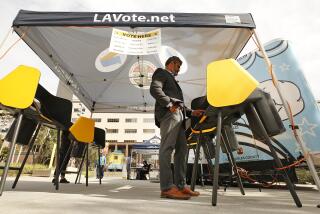Matsui May Seek Cranston Senate Seat
- Share via
WASHINGTON — Rep. Robert T. Matsui (D-Sacramento) has decided to challenge Sen. Alan Cranston of California for the Democratic Senate nomination in 1992, hoping to capitalize on Cranston’s flagging popularity in the wake of the Lincoln Savings & Loan scandal, sources said Thursday.
Matsui, a six-term House member, is the first of what may be several potential Democratic challengers to Cranston, who is under investigation by the Senate Ethics Committee for his efforts on behalf of the Irvine thrift’s owner.
Matsui’s decision to challenge Cranston is a measure of how seriously the incumbent has been weakened politically by Lincoln’s $2-billion collapse and the subsequent ethics scandal. Until recently, no other Democrat would have dared to challenge the Senate’s second-ranking Democratic leader.
Nevertheless, Cranston’s campaign manager, Kam Kuwata, greeted the news of Matsui’s decision with scorn. “If he runs,” said Kuwata, “he’ll end his career.”
According to sources, Matsui has told many of his closest acquaintances in Washington that he has made a firm decision to enter the Senate race shortly after this November’s election, when he hopes to be reelected to a seventh House term.
Although Matsui declined to confirm the reports, he acknowledged that he is considering a bid against Cranston. “People are talking to me about it, and I am looking,” he said in a telephone interview from Sacramento.
One source in Washington said Matsui is reluctant to announce his intentions now because “he does not want to appear to be dancing on Alan’s grave.”
As a Japanese-American who led a congressional battle to win $1.25 billion in reparations for 66,000 people who, like himself, lived in detention camps during World War II, Matsui can expect considerable financial and voter support from California’s Asian-American community. In addition, his service on the House Ways and Means Committee gives him access to contributions from many national political action committees.
Sources said Matsui was encouraged to enter the race by a recent Times poll showing that Cranston’s popularity had plunged from a 56% favorable, 32% unfavorable reading as recently as early October to a 32% favorable, 58% unfavorable rating in early December.
Cranston, a consummate political fund-raiser, acknowledged last month that the Lincoln scandal had hurt his ability to raise money for his 1992 race. But he predicted that he would make up for lost time during the congressional recess that ends Jan. 24.
Many Democratic Party leaders in California are hoping Cranston will decide not to seek reelection in the face of primary opposition. But the incumbent, who will be 78 years old in 1992, has said frequently he has no intention of reconsidering his decision to seek a fifth term.
Political analysts said Cranston’s longstanding image as a champion of the little guy was tarnished by his intervention with federal regulators on behalf of Lincoln, which was seized by the government last April and is expected to become the nation’s most costly S&L; collapse.
Lincoln owner Charles H. Keating Jr. was a major contributor to Cranston’s 1986 reelection race, and Cranston later joined four other senators in meeting with regulators to discuss Keating’s complaints about their efforts to crack down on the institution.
Not only is Lincoln’s collapse expected to cost taxpayers more than $2 billion, it rendered worthless nearly $250 million in bonds issued by Lincoln’s parent company and purchased in many cases by elderly thrift customers. Several bondholders have said they hold Cranston personally responsible for their losses.
If Cranston bows out, according to sources, Rep. Mel Levine (D-Santa Monica) would probably enter the race against Matsui. Even if Cranston remains in the race, Rep. Barbara Boxer (D-Greenbrae) is likely to seek the nomination with the strong support of pro-choice activists in California.
Although Matsui, Boxer and Levine may not enjoy statewide name recognition, each lawmaker already has a House campaign war chest that could be spent on a Senate race. Any California-based challenger would have to start a federal political action committee from scratch.
Matsui’s campaign fund currently contains $750,000.
Nevertheless, party strategists believe that Matsui should waste no time in announcing his candidacy for 1992. Because Matsui has twice previously declined to run statewide after considering a race, they said, Democrats will be skeptical of his intentions until he actually throws his hat in the ring.
“He has a tendency to like the idea of talking about running instead of actually running,” Kuwata said. “My guess is he’ll look at the race, consider it and decide he is not running.”
More to Read
Get the L.A. Times Politics newsletter
Deeply reported insights into legislation, politics and policy from Sacramento, Washington and beyond. In your inbox twice per week.
You may occasionally receive promotional content from the Los Angeles Times.










